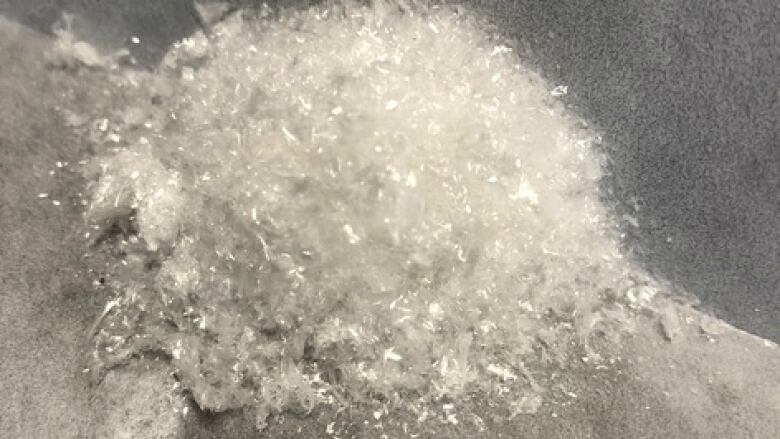Perfecting plastic: How MUN researchers are working toward a biodegradable plastic
Carbon dioxide used to create an alternative to plastic

Waves of Change is a CBC series exploring the single-use plastic we're discarding, and why we need to clean up our act. You can be part of the community discussion by joining our Facebook group.
With the provincial government continuing its research on the possibility of banning single-use plastic bags, graduate students in chemistry at Memorial University are researching new materials that would make bags biodegradable.
Kori Andrea says it would likely be difficult to ban plastics altogether, but she's part of a team of researchers workingto create a better, more environmentally friendly alternative that would break down at the end of its life.
Andrea saidshe's using the carbon dioxide abundant in the environment as the basis for new biodegradable materials.
"What we're looking at is being able to take carbon dioxide and actually use it as a starting material in these polymers or plastics that we're making," she said.
"We're taking carbon dioxide, we're reacting it with another starting material called epoxides, and then making these alternating polycarbonates, and these are your plastics."

Andrea said many plastic materials now in use are made from petroleum products, which are built with carbon-hydrogen bonds and don't easily decompose.
"It's hard to break down because if you think of the organisms and bacteria in the environment today, they don't have to break down bonds like that, so of course, everything bioaccumulates over time," she said.
"With incorporating carbonate linkages, these carbon-oxygen bonds in our materials, there are bacteria out there that are capable of breaking these things down."
Modifying materials
It's a case of "Mother Nature knows best," Andrea said, using raw materials that fit with natural processes.
Andrea said some of these biodegradable plastic-like materials are already being made by companies in the United Statesand the United Kingdom, but they have drawbacks.
She said she and other researchers at MUN are modifying the materials they are making to make them more heat-resistant for things like lids for paper coffee cups, or to have different densities to mimic different pre-existing materials.
"We're looking at taking our materials and alternating them one way or another can we make something similar to a plastic wrap that's very flexible? Can we make something similar to what milk jugs are made of that's a bit more durable?" said Andrea.
"We have recently found some different ways to modify them and start to really change their melting points or their durability. We are getting there. We're still at the fundamental stage and the development on the lab scale."
Scaling up
The challenge now, she said, is to make these products on a large scale with existing technologies and equipment.
Andrea said high pressure is needed to make the carbon dioxide react, so she's designing catalysts to make those reactions occur without high pressures or temperatures.
But it's hard to know what the end products will cost until they are scaled up to produce larger quantities.
"Can we make them? Yes. Can we make them cheaper than the processes that have been optimized for 50-plus years? I don't think we're there yet," she said.
"But will we get there? I think we definitely will."
Join the discussion on the CBC Waves of Change Facebook group, or send us an email: wavesofchange@cbc.ca.
With files from On The Go












_(720p).jpg)


 OFFICIAL HD MUSIC VIDEO.jpg)
.jpg)



























































































